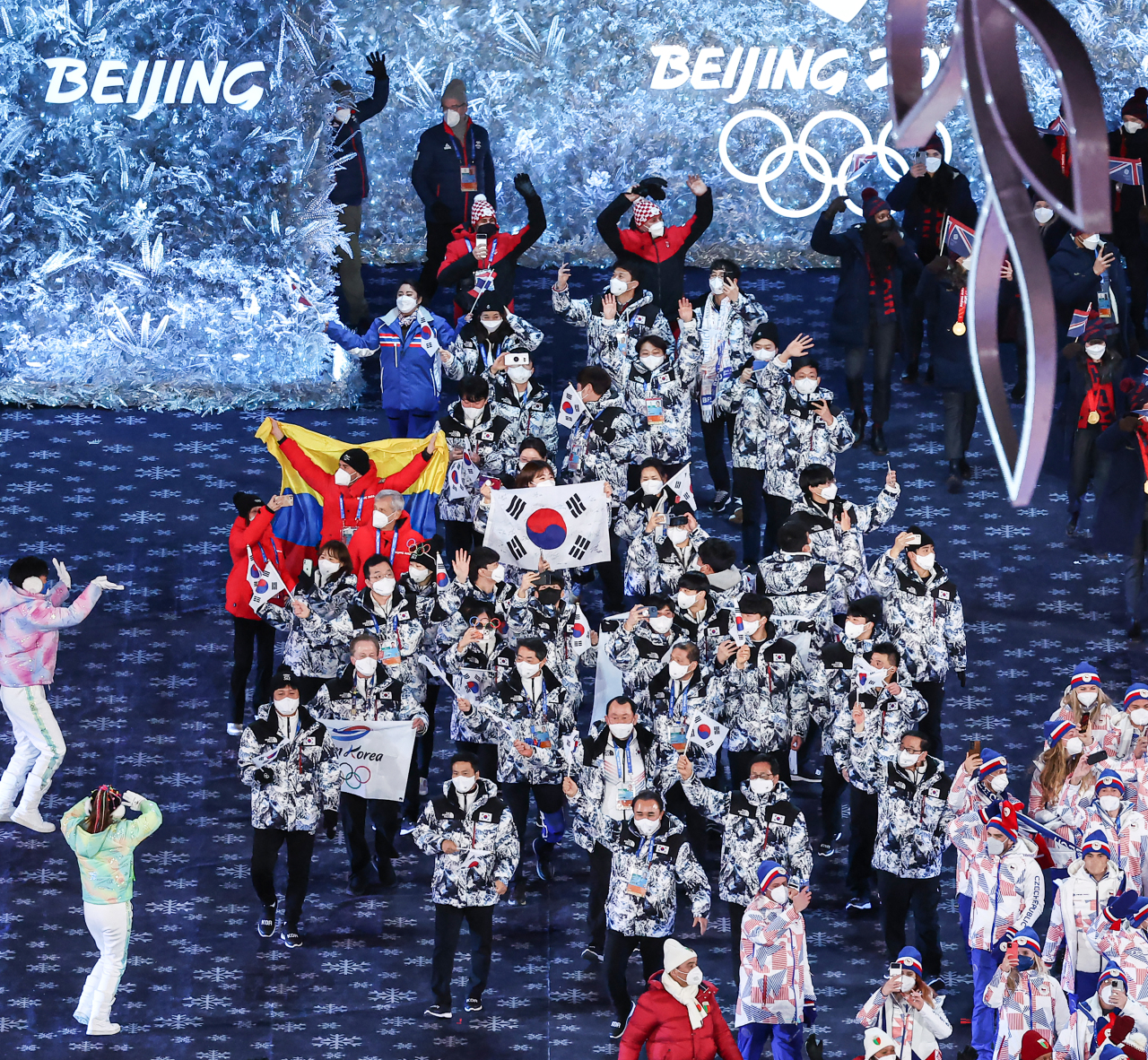 |
The South Korean delegation enters the National Stadium in Beijing on Sunday for the closing ceremony of the 2022 Winter Olympics. (Yonhap) |
BEIJING -- The Olympic flame in Beijing was extinguished on Sunday to mark the conclusion of the first Winter Games during the global COVID-19 pandemic, as a muted closing ceremony celebrated athletic feats from snow, ice and track over the past two weeks.
The 24th Winter Olympics put participating athletes, officials, workforce and media into a bubble, or formally called the "closed-loop system," to keep them separated from the general public in the Chinese capital. They were confined to official Olympic training or competition venues and their accommodations. No international spectators were permitted, with only the invited few among the Chinese people enjoying firsthand looks at competition.
South Korea won two gold medals, five silver medals and two bronze medals, all of them from short track and long track speed skating, to finish 14th. It's the country's lowest position since finishing 14th at Salt Lake City 2002. The Korean Sport & Olympic Committee (KSOC) had set a modest target of winning one or two gold medals and finishing inside the top 15.
The buildup to Beijing 2022 was marred by concerns over the spread of COVID-19 and by the U.S.-led diplomatic boycotts over China's poor human rights record.
And there was no shortage of controversy once the competition began. South Korea felt wronged by what it believed was biased refereeing in the early days of short track speed skating, though its athletes put distractions aside to grab five medals -- more than any other country in the sport.
Choi Min-jeong led the way by defending her 1,500m gold medal and adding silver medals in the 1,000m and 3,000m relay. On the men's side, Hwang Dae-heon, once at the center of the officiating controversy, won the 1,500m gold medal and the 5,000m relay silver medal.
Four medals came from the oval for South Korea. Cha Min-kyu in the men's 500m and Kim Min-seok in the men's 1,500m each defended their silver and bronze medals from four years ago. On Saturday, the final day of speed skating races, Chung Jae-won and Lee Seung-hoon took silver and bronze medals.
Per health and safety protocols, Beijing organizers and the International Olympic Committee (IOC) recommended that athletes leave China within 48 hours of their last event, unless they chose to participate in the closing ceremony.
South Korea had 15 athletes and 21 officials from speed skating, curling and bobsleigh, according to the KSOC.
Cha, the speed skating silver medalist, was the South Korean flag bearer at the closing ceremony.
Norway won the medal race for the second consecutive Winter Games with 16 gold medals and 37 medals overall. Germany, with 12 gold medals, was the only other country to surpass double figures in the gold medal count.
The host China finished third with nine gold medals and 15 medals in total, both its record for a Winter Olympics.
Beijing 2022 completed an unprecedented run of three consecutive Olympics in Asia. It began with the 2018 Winter Games in South Korea's PyeongChang, followed by the Tokyo Summer Olympics, which took place in 2021 after a one-year postponement caused by the pandemic.
The Olympic Flag is now with Milan and Cortina d'Ampezzo, the Italian co-host cities of the next Winter Games in 2026. (Yonhap)








![[Out of the Shadows] Seoul room clubs offer drugs to compete for clientele](http://res.heraldm.com/phpwas/restmb_idxmake.php?idx=644&simg=/content/image/2024/11/05/20241105050566_0.jpg)